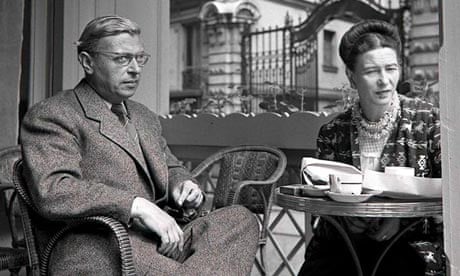Simone de Beauvoir, whose semi-detached love affair and intellectual companionship with Jean-Paul Sartre lasted all their adult lives, has told the story of his last 10 years in an emotional memoir, La cérémonie des adieux – The Farewell Ceremony – which is getting a mixed reception in Paris.
Sartre's physical decline began early, when he was 65. He and Simone de Beauvoir fought the 10-year struggle against blindness and illness together. But there were times when he slipped her anxious surveillance and seemed to be running towards the death that finally met him 19 months ago. He smoked heavily and persuaded his numerous young girl friends to smuggle him bottles of Scotch and vodka. He was found lying blind drunk on the carpet.
"I wanted to help you die cheerfully – I thought that was what you wanted," said an unrepentant woman friend who had spent an evening drinking an entire bottle of whisky with Sartre.
"But he had absolutely no desire to die," declares the indignant De Beauvoir, who tells in her book how she briskly dismissed this wayward guardian from her Saturday night watch over the sick writer.
Some shock has been caused by the precision with which De Beauvoir records the trivia of senility. We not only learn about the food spilled round Sartre's mouth, his lapses of memory, the damp patch left on the chair after he rose and the bowel accidents; we also learn how often these lapses occurred and how horrified she was on each occasion.
But the object of all this soon becomes movingly clear. The brief memoir is a condensed day-to-day diary of a woman's defence of her companion against the inroads of death. She is out to shield his body and his lifespan. But he – almost blind, walking with difficulty, filled by the doctors with drugs to hold up his arteries – wants the stuff of life. He mourns for his eyes and cares very little about loss of command further down. "Some cats have peed on me," he remarks mildly on a walk through Rome. The pitying Simone is not deceived.
At the end, money was a grave worry for Sartre. He had over-spent his considerable fortune as an author on needy friends and good causes. Simone de Beauvoir was forced to recognise, too, that many years earlier he had begun to squander the physical resources she was trying so hard to shore up. To get his larger works written he had cut out all rest and relaxation and filled himself with stimulants. She saw that he was aware of having accepted a bargain: to produce his philosophical writings and die a little earlier.
"Sartre had the decline and death his life demanded," she writes. "And that is perhaps why he accepted them so calmly."
This is an edited extract

Comments (…)
Sign in or create your Guardian account to join the discussion